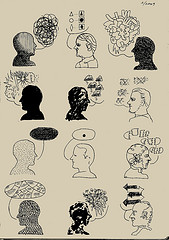Jun 20, 2012 2
Integrative Behaviors
I told my wife the other night that she was more “integrated” than I was as a person. She asked what I meant, so I explained.
Every one of us has different aspects to our personality: who we are at home; who we are with friends; who we are at work; who we are when we’re sick; who we are when we’re sad; who we are when we’re having sex; who are we when a cop pulls us over; who we are when we’re grumpy; etc.
For most people, these various aspects are not that far apart from each other. Who one is when melancholy isn’t that different from who one is when excited, etc. I’m not saying that these states don’t feel different, just that who we are when we are in these states remains more or less constant. If we think of the self as a hand, the fingers are never far from each other.
For others, myself included, however, there can be a real divergence amongst our selves. This divergence expresses itself most clearly when we regret what we do in certain states—the thing we say or do in anger; self-destructive coping behaviors when depressed, and so on. The fingers, in this case, seem to belong to different hands.
I once described enlightenment as “being the same person to everyone we meet.” Such enlightenment is the fruit of integration. We attain this integration through integrative behaviors, behaviors in which we are one with what we’re doing as when we are engaged in physical exercise, meditating, immersed in a meaningful task, or reflecting on ourselves and speaking honestly.
We undermine this integration when we engage in dis-integrative behaviors—when we dissemble, when we cultivate secrets and scheme, when we indulge and hide our addictions.
For some, achieving the integration of which I speak seems effortless, a simple and organic aspect of their nature. For others, it requires hard-won self-awareness and ongoing effort. However easy or difficult it may be, I firmly believe that it is one important goal of human being.

 I’ve been a “
I’ve been a “
